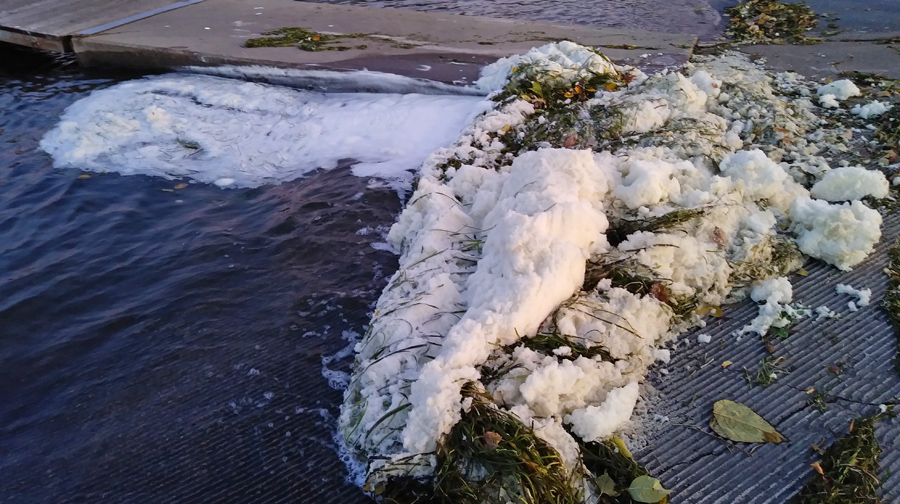Water Tech Challenge Targets PFAS
Winning innovators would gain corporate resources to solve water quality problems.

Foam present in Starkweather Creek in October shows elevated levels of PFOS and PFOA (PFAS chemicals). Photo courtesy of the DNR.
The Water Council, a non-profit based in Milwaukee, has announced a contest intended to develop new water technology for sensing or remediating dangerous contaminants in water.
Specifically, the council is looking for technology that can sense or remediate heavy metals and industrial chemicals — and thereby provide solutions to some of the water quality problems bearing down on Wisconsin communities urban and rural.
The contest is simply called the Tech Challenge and will accepts applications from technology innovators from a variety of backgrounds. Anyone from anywhere in the world can apply — tinkering individuals, students, researchers, educators and public or private lab professionals.
Innovations that make it through will compete for funding for their resource or invention, the opportunity to commercialize and take their invention to market with one of the corporate sponsors and access to expertise and feedback from the sponsors’ R&D teams.
The first tech challenge was in 2018. Since then, 38 companies from around the world have provided “novel solutions” to some of the technology gaps at the sponsoring firms, according to the council. These past sponsors are working with many past challenge applicants to see if they may fit into their R&D programs.
The challenge is designed to be mutually beneficial for both sponsoring companies and the entrepreneurs in the field of water technology. The sponsors get access to new ideas and the entrepreneurs get access to the sponsors resources.
In Milwaukee and across the state, localities are dealing with the legacy of PFAS (per- and polyfluoroalkyl substances) pollution. These forever chemicals are tied to a number of diseases and pregnancy complications, potentially even cancer. They were commonly used in fire-fighting foam. And they’ve been found in drinking water and bodies of water all over the state. Recently, they were identified in the Milwaukee Estuary, where the Milwaukee, Menomonee and Kinnickinnic Rivers converge.
This latest round of the Tech Challenge could potentially identify and scale up solutions to help identify or remediate the chemicals in local communities.
For each challenge, R&D teams from the corporate sponsors identify areas that may be a source of “heartburn” for the business, said Stacy Stevens, vice president of marketing and communications for the council. They identify areas where solutions to their own problems could provide solutions to broader problems with water in society, she said.
If you think stories like this are important, become a member of Urban Milwaukee and help support real, independent journalism. Plus you get some cool added benefits.
More about the PFAS Problem
- Environmental Groups, Community Advocates Push for PFAS Deal - Henry Redman - Jul 14th, 2025
- Environmental Advocates Hail Wisconsin Supreme Court Decision in Evers v Marklein - Midwest Environmental Advocates - Jul 8th, 2025
- Wisconsin Supreme Court Backs State Regulators of PFAS Pollution - Danielle Kaeding and Rich Kremer - Jun 24th, 2025
- Gov. Evers Releases Statement on Wisconsin Supreme Court Decision in WMC Inc v. DNR - Gov. Tony Evers - Jun 24th, 2025
- Rep. Shelia Stubbs Elected Great Lakes-St. Lawrence Legislative Caucus Vice Chair of the Task Force on Emerging Contaminants - State Rep. Shelia Stubbs - Jun 16th, 2025
- Legislature’s Budget Committee Unanimously Boosts Clean Water Funding By $732 Million - Danielle Kaeding - Jun 6th, 2025
- Trump Administration moves to weaken standards for toxic ‘forever chemicals’ in drinking water - Clean Wisconsin - May 14th, 2025
- Wisconsin Officials Unhappy With EPA Plan To Weaken PFAS Standards - Danielle Kaeding - May 14th, 2025
- Wisconsin Could Lose $55 Million Under Proposed EPA Budget Cuts - Danielle Kaeding - May 7th, 2025
- French Island Makes Progress on PFAS Pollution - Richelle Wilson and Trevor Hook - Mar 24th, 2025
Read more about PFAS Problem here




















